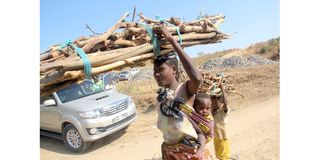Unpaid care: Why men, women should be concerned

A woman with her children heading back home after collecting firewood. Women carry the heavier burden of unpaid care and domestic work.
What you need to know:
- State Department of Gender is establishing unpaid care and domestic work policy.
- It will give guidance on compensation of women who are disproportionately represented in unwaged labour.
- On average, a man in Kenya earns 39 per cent more than a woman.
The State Department of Gender is in the process of establishing unpaid care and domestic work (UCDW) policy. This framework would give guidance on compensation of women who are disproportionately represented in unwaged labour.
But what is UCDW and why should men and women care about it?
In Oxfam’s 2021 report on Addressing unpaid care and domestic work for a gender-equal and inclusive Kenya,UCDW is defined as the often-invisible work of caring for children, elderly and sick people. It is also caring for those living with disability, as well as cleaning, cooking, washing, collecting water, and fetching firewood, among other tasks.
Consider this; in Tanzania, women spend 3.5 times more minutes per day on UCDW than men according to 2018, East African Community Regional Integration: Trade and Gender Implications report by United Nations Conference on Trade and Development.
It is three times more minutes per day for women in Rwanda and Uganda 1.2 times more minutes.
In Kenya, findings from Oxfam’s 2019 household care survey show a similar pattern.
A total of 328 women and 42 men from informal settlements of Kibera, Mathare, Mukuru, Kawangware and Korogocho in Nairobi city, were surveyed.
It established that women spent 11.1 hours per day on any care compared to just 2.9 hours per day for men.
But men spent almost double the time that women spent on paid work.
When women spent 5.3 hours, men spent 10.5 hours. This means a woman would earn less if they were on an hourly wage.
Going by Gender Gap calculator created by Code for Africa, on average a man in Kenya earns 39 per cent more than a woman. This implies that when inflation hits, women’s pockets are wiped faster than those of men.
On February 8, 2020, UN Secretary-General António Guterres, said there are 127 women for every 100 men aged between 25 and 34 living in extreme poverty in sub-Saharan Africa.
He said this in his remarks during a high-level meeting on gender equality and women’s empowerment in Africa, in Addis Ababa, Ethiopia.
He attributed the disparities in poverty to the higher number of women in precarious jobs and the heavier burden of UCDW on their shoulders.





